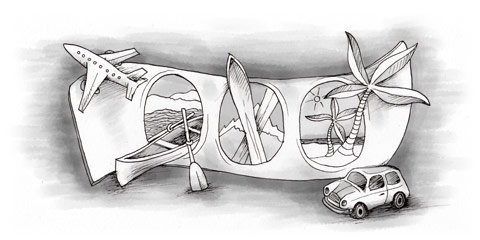Courts (many floodlit) have a variety of surfaces, including tennis-quick (fast cement court), clay ( arcilla), cement ( hormigón), artificial grass and plexipave. There are also indoor courts in the north of Spain, although these are rare in the south and the islands, where the weather permits outdoor tennis to be played all year round. Many tennis clubs offer a variety of other sports facilities, including swimming pools and a gymnasium or fitness centre.
Most clubs open from early morning until as late as 11pm or midnight. Many urbanisations have private tennis courts which can be used free of charge by residents (they’re maintained through community fees), although floodlighting must usually be paid for via a coin meter. Courts are usually available on a first come, first served basis, although there may be a booking system in the summer season when demand is high.
Weekly, monthly and six-monthly membership may also be available. Most clubs have special rates for families, children (e.g. under 18) and possibly senior citizens. Many clubs provide saunas, whirlpools, solariums and swimming pools, and most have a bar and restaurant.
All clubs organise regular tournaments and provide professional coaching (individual and group lessons), and many clubs and hotels offer resident tennis schools throughout the year. Individual lessons cost from around €25 an hour. Information regarding competitions and tennis clubs can be obtained from the Royal Spanish Tennis Federation (Real Federación Española de Tenis), Avda Diagonal, 618 –2ºB, 08021 Barcelona (932-005 355, http://www.rfet.es ).
Tennis was long regarded as an elite sport in Spain and although it remains so in some private clubs, it’s now a sport of the people and one of Spain’s most popular participant sports. In the last few years, Spain has become one of the world’s strongest tennis countries – Spain is top of the Davis Cup rankings and was the 2004 champion.
Its many top male tennis players include Albert Costa, Carlos Moya, Alex Corretja, Juan Carlos Ferrero, Feliciano López and current world no.2 Rafael Nadal, winner of the French Open in 2005 and 2006, and runner-up at Wimbledon in 2006. Among the best female players are Conchita Martínez, Virginia Ruano and Magüi Serna. Spain’s top female player, Arantxa Sánchez Vicario, retired in 2002. The majority of top players come from Catalonia, the powerhouse of Spanish tennis.
Squash is gaining popularity in Spain with an increasing number of courts in many areas. There are now squash clubs in most large towns and many tennis clubs and sports centres have a number of squash courts.
However, the standard is relatively low due to the lack of experienced coaches and top class competition, although it’s continually improving. Rackets and balls can be rented from most squash clubs for the American version of squash, called racket ball, which is played in Spain on a squash court. Badminton isn’t widely played and facilities are rare, although some sports centres have badminton courts and there are badminton clubs in some areas.
This article is an extract from Living and Working in Spain.
Click here to get a copy now.




